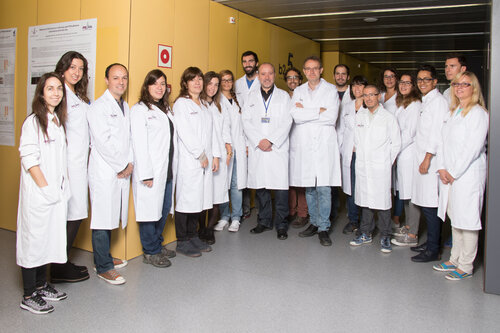A study with the participation of researchers from Lleida demonstrates the link between intestinal microbes and recent memory
Discovery opens the way to the development of individualized diets to improve memory
The type of bacteria in the gut, called intestinal microbiota, is related to recent memory. This is the conclusion of a study carried out by researchers from the Institute of Biomedical Research of Girona (IDIBGI), the Laboratory of Neuropharmacology at Pompeu Fabra University and the Institute of Biomedical Research of Lleida (IRBLleida). The study has been published in the journal Cell Metabolism.
The study is entitled "Obesity Impairs short-term and working memory through gut microbiota metabolism of aromatic amino acids" and a total of 130 subjects, including both obese and non-obese, participated in it. All of them have been analysed with different plasma metabolites in addition to the intestinal microbiota. They were also administered different cognitive pots and the volume of certain brain areas involved in memory (the hippocampus and the prefrontal cortex) was measured by magnetic resonance.
The metabolic analyses have been performed at IRBLleida and the study has involved the participation of IRBLleida researchers Reinald Pamplona, Joaquim Sol, Mariona Jové and Manuel Portero-Otin from the Metabolic Physiopathology Group.
In addition to the researchers from Girona led by Dr. José-Manuel Fernández- Real, Professor of Medicine at the University of Girona, head of the Nutrition, Eumetabolism and Health Group at IDIBGI, head of the Endocrinology Section at the Josep Trueta University Hospital of Girona and researcher at CIBEROBN, the study also benefited from the collaboration of professionals from the Pompeu Fabra University of Barcelona and the University of Valencia. FISABIO Foundation and CIBEResp.
In normal conditions, tryptophan is found in the blood circulation, an aromatic amino acid that is essential for the "synthesis" of neurotransmitters. It was found that people with morbid obesity who had less recent memory also had less circulating tryptophan. On the other hand, the production of some vitamins depends on the *microbiotic bacteria. People with obesity had certain bacteria which *metabolitzed vitamin B1 in parallel with the decline in immediate and recent memory. As for the hippocampus, it is already known that its measurement is related to the individual's memory: it was observed that obese people had a smaller volume of the hippocampus. Interestingly, the measurement of the hippocampus was also associated with the presence of certain bacteria from the intestinal microbiota.
Subsequently, trials were conducted with mice, which received a transplant of faecal microbiota from the patients to assess how the presence of certain intestinal bacteria affects the recent memory of the rodents. The result was conclusive and it was shown that the transplantation of bacteria present in morbidly obese patients decreased the memory score of the mice. Since the subjects' habitual diet was associated with the presence of certain intestinal bacteria, all these results open the door to the development of individualised diets that can scientifically improve cognitive performance and memory.
Text: IDIBGI and IRBLleida communication
IRBLleida belongs to the Institution of Research Centres in Catalonia (iCERCA), which is organised according to a model of good governance and operation that ensures the efficiency, management flexibility, attraction and promotion of talent, strategic planning and executive capacity of the research centres in Catalonia.

The research was carried out by IRBLleida researchers Reinald Pamplona, Joaquim Sol, Mariona Jové and Manuel Portero-Otin from the Metabolic Physiopathology Group






